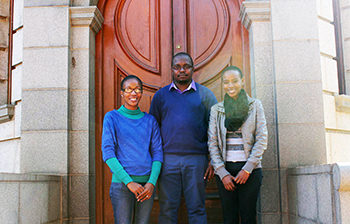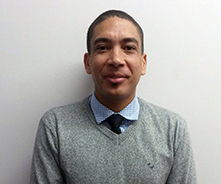Latest News Archive
Please select Category, Year, and then Month to display items
29 August 2024
|
Story Anthony Mthembu
|
Photo Harmse Photography
 Ross van Reenen, CEO of the Toyota Free State Cheetahs.
Ross van Reenen, CEO of the Toyota Free State Cheetahs.
The Business School at the University of the Free State (UFS) recently hosted the CEO of the Toyota Free State Cheetahs, Ross van Reenen, for a guest lecture. Van Reenen presented the guest lecture in the Business School Auditorium on the UFS Bloemfontein Campus on 21 August 2024.
Reflecting on Van Reenen’s address
In a lecture addressed to an auditorium filled with UFS staff and students, Van Reenen’s talk was divided into several sections. Firstly, he spoke about the concept of the ‘black swan’ in reference to the book written by Nassim Nicholas Taleb, titled The Black Swan: The Impact of the Highly Improbable. Referring to Taleb’s book, Van Reenen defined a ‘black swan’ as a rare event that has a severe impact, and the occurrence of which people try to explain. He used some examples to explore this concept as well as its implications, including COVID-19 and its impact on the world, and the tragic death of the people in the Titanic disaster. However, he delved deeper into 9/11 and the extent of its impact, saying that “9/11 was a major wake-up call in the world economy”. Van Reenen highlighted how some companies such as Barclays, for which he previously consulted, had to work to be up and running after the collapse of the Twin Towers in 9/11.
In addition, Van Reenen’s lecture also touched on the importance of the first ninety days of a job after an individual has been employed. “Those first ninety days are crucial, as you have to establish yourself in a company where you are paid less than you are worth,” Van Reenen said. As such, he gave the audience insight into what they could focus on in that time frame. This includes focusing on the small wins, as well as ensuring that you are working at keeping the team together, as the team is an integral part of an organisation.
Van Reenen concluded his address by speaking about his time as the CEO of the Toyota Free State Cheetahs, including some of the decisions he took to ensure the success of the organisation.
nGAP lecturers welcomed by the UFS academic community
2016-06-30

University of the Free State’s newly-appointed nGAP
lecturers. From the left, Neo Mathinya,
Phumudzo Tharaga, and Kelebogile Boleu.
The University of the Free State (UFS) was allocated six positions as part of the Department of Higher Education and Training (DHET) New Generation of Academics Programme (nGAP). Four candidates have filled positions in the Faculty of Health Sciences, Faculty of the Humanities and the Faculty of Natural and Agricultural Sciences – with two positions still vacant.
According to Minister of Higher Education and Training, Dr Blade Nzimande, nGAP is part of the Staffing South Africa's Universities Framework, which focuses on the expansion of the size and compilation of academic staff at South African universities, especially with regard to transformation. The focus of the programme is the appointment of black and coloured candidates as well as women.
The Department of Soil, Crop, and Climate Sciences in the Faculty of Natural and Agricultural Sciences welcomed two nGAP lecturers, Phumudzo Tharaga and Neo Mathinya. The Faculty was allocated four positions. Two positions are filled, while two positions in the Department of Animal and Wildlife Sciences are almost ready to be filled with exceptional candidates.
Agrometeorologist with his feet on the ground
Phumudzo Tharaga holds an MSc from the UFS, and is currently pursuing a PhD. Tharaga’s research focuses on quantifying the water use efficiency of sweet cherry orchards under different climate conditions in the Eastern Free State. Tharaga will offer his students a wealth of practical experience, which he began accumulating while working at ABSA as an agro-meteorologist, before moving on to become a senior scientist at the South African Weather Service. In 2015, Tharaga became a research technologist at the Council for Scientific and Industrial Research (CSIR) and then returned to the UFS as an nGAP candidate at the beginning of 2016.

Beynon Abrahams, nGap lecturer
at the Faculty of Heath Sciences
Department of Basic medicine
Motivated scholar turned academic
Neo Mathinya, who hails from Taung in the North West, has made the UFS her home. She received both her undergraduate and honours degrees from the university. Apart from joining the department as a lecturer under the nGAP initiative, she is currently studying for her MSc in Soil Physics. She will continue with this research when she comes to her PhD. Mathinya’s research focuses on soil salinity - the process of increasing salt content - which affects the ability of plants to take up water, a process, known as osmotic stress. She will investigate the effects of irrigation water salinity on the grain yield and quality of malt barley.
Researcher with a passion for crime prevention
Kelebogile Boleu joined the Department of Criminology in the Faculty of Humanities, with a fresh take on diversion and crime prevention. Boleu holds a BA Criminology (Hons) and is now pursuing her Master’s degree. She worked for NICRO a non-profit organisation specialising in social crime prevention and offender reintegration, with programmes that prevent young and first-time offenders from re-offending, thus reducing crime. Boleu said that her practical experience makes her lectures to third-year criminology students exciting. Boleu’s research focuses on analysing the value of pre-sentencing reports in assisting adjudicators to make well-balanced judgments in cases.
Research with a winning plan for fight against breast cancer
Beynon Abrahams joined the Department of Basic Medical Sciences in the Faculty of Health Sciences. Abrahams holds a BSc, BSc (Hons), and MSc in Medical Biosciences from the University of the Western Cape. Abrahams’ Master’s research focused on breast cancer, research on which he is building in his PhD. This doctoral research involves the exploration of P-glycoprotein, a protein expressed on cancer cell and responsible for multi-drug resistance in cancer treatment. The aim of this research is to develop a therapeutic drug treatment strategy that will improve breast cancer patient survival outcomes. Abrahams’s greater vision is to look at conventional cancer therapeutic regimens, to find ways in which they can be improved.
The nGAP initiative offers these young lecturers an opportunity for growth and development as academics, while providing them with opportunities they would have not have been exposed to otherwise.